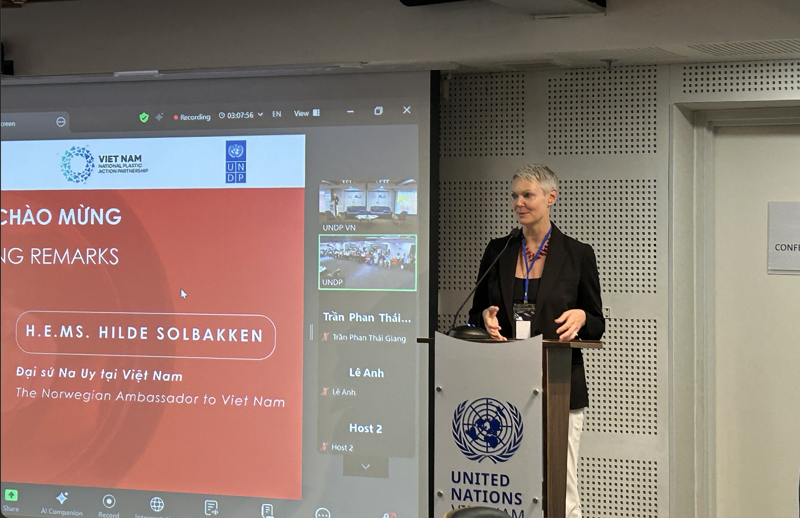A well-designed Deposit Return System (DRS) can be a game-changer for Vietnam to drastically cut plastic waste, as well as contribute to Vietnam’s climate goal of achieving net zero by 2050, according to Ambassador of Norway to Vietnam Hilde Solbakken.
According to the Scoping Study for a nationwide DRS for Vietnam launched by the Norwegian Embassy in Hanoi and Innovation Norway Vietnam on June 16, alongside Extended Producer Responsibility (EPR), a DRS in Vietnam offers a potentially significant and effective measure implementing the Government’s drive towards a circular economy, as outlined in the country’s 2020 Law on Environmental Protection.
Specifically, a DRS can achieve very high recycling rates and therefore reduce the reliance on raw materials for new products and reduce adverse impacts on the environment as envisioned in this Law. An effective DRS, which adopts global best practices and lessons learned and is tailored to Vietnam’s local context, could bring significant environmental, economic and social benefits to Vietnam, not to mention provide job and business opportunities in the green economy.
While DRS has been proven an effective tool for achieving very high return rates of beverage containers for recycling in over 40 jurisdictions worldwide, no other Southeast Asian country has yet implemented a nationwide DRS for single-use beverage containers. Therefore, the system's success in Vietnam could serve as an inspiring model for neighbouring nations.
H.E. Hilde Solbakken said that the report concludes that a deposit return scheme is possible in Vietnam and could bring great socio-economic and environmental benefits. DRS has the potential to stimulate a new recycling industry and provide green jobs, and it could significantly reduce the amounts of plastic bottles ending up in nature or in landfills.
According to the study, Vietnam needs a separate DRS system that is suitable for socio-economic conditions such as the beverage market and domestic solid waste management infrastructure. Therefore, the study has detailed technical specifications for Vietnam's DRS system along with recommendations for necessary preparations to ensure practical effectiveness when applying this model.
It is expected that, if implemented effectively, the DRS system will divert up to 77,000 tons of packaging waste from landfills annually, cutting 265,000 tons of CO₂e emissions, while creating about 6,400 formal jobs and 9,600 opportunities in the waste-related freelance labor sector.
The study also found that this design is consistent with Vietnam’s EPR policy and contributes positively to national goals of reducing ocean plastic pollution and achieving net zero emissions by 2050.
For Norway, clean and healthy oceans are a national priority and a global responsibility. As a maritime nation, we are deeply committed to protecting marine ecosystems and reducing plastic pollution. In 2018, the Norwegian government launched a program to combat marine litter and microplastics, with an initial funding of $100 million, the Ambassador said.
In 2024, we pledged an additional 100 million dollar to continue supporting efforts to tackle plastic waste. Vietnam – and the Ministry of Agriculture and Environment in particular – has been a key partner in this important work, she added.
"Vietnam’s strategy to become a strong maritime nation, includes addressing pollution, protecting marine and coastal areas, and restoring ecosystems," the Ambassador went on, adding that "The National Action Plan on Marine Plastic Litter Management sets an ambitious goal of 75 per cent reduction in marine plastic waste by 2030. A well-designed DRS can be a game-changer for Vietnam to drastically cut plastic waste, as well as contribute to Vietnam’s climate goal of achieving net zero by 2050."
The Ambassador pointed out that DRS is a tool to operationalize EPR. The fundamental aspect of EPR is the “polluter pays principle”. Deposit Return Schemes are a powerful way to turn waste into a valuable resource. It holds the private sector accountable while securing stable and predictable sources of financing.
The role of the private sector is absolutely crucial for an effective EPR scheme, including Deposit Return Schemes. Norway has several well-established EPR schemes related to plastics, batteries, end-of-life vehicles, tires and packaging, according to the ambassador.
In each sector, the companies organize in a so-called “Producer Responsibility Organisation” – or PRO. The government has given the PROs the responsibility to set up a functioning EPR system for their products, and to form and fund the system operator for Deposit Return Schemes.
"Experience from Norway and other countries shows that mandatory Deposit Return Schemes are most efficient, and that ambitious targets for return rates are essential to drive innovation and achieve success," she said. "This drives innovation in the private sector to maximize cost-efficiencies of the system. Norway is committed to continue supporting Vietnam in building a more circular, greener future. I want to express our deep appreciation to the Ministry of Agriculture and Environment for our excellent cooperation (on so many issues leading to a more sustainable future) and for your willingness to explore policy innovations like DRS."









 Google translate
Google translate